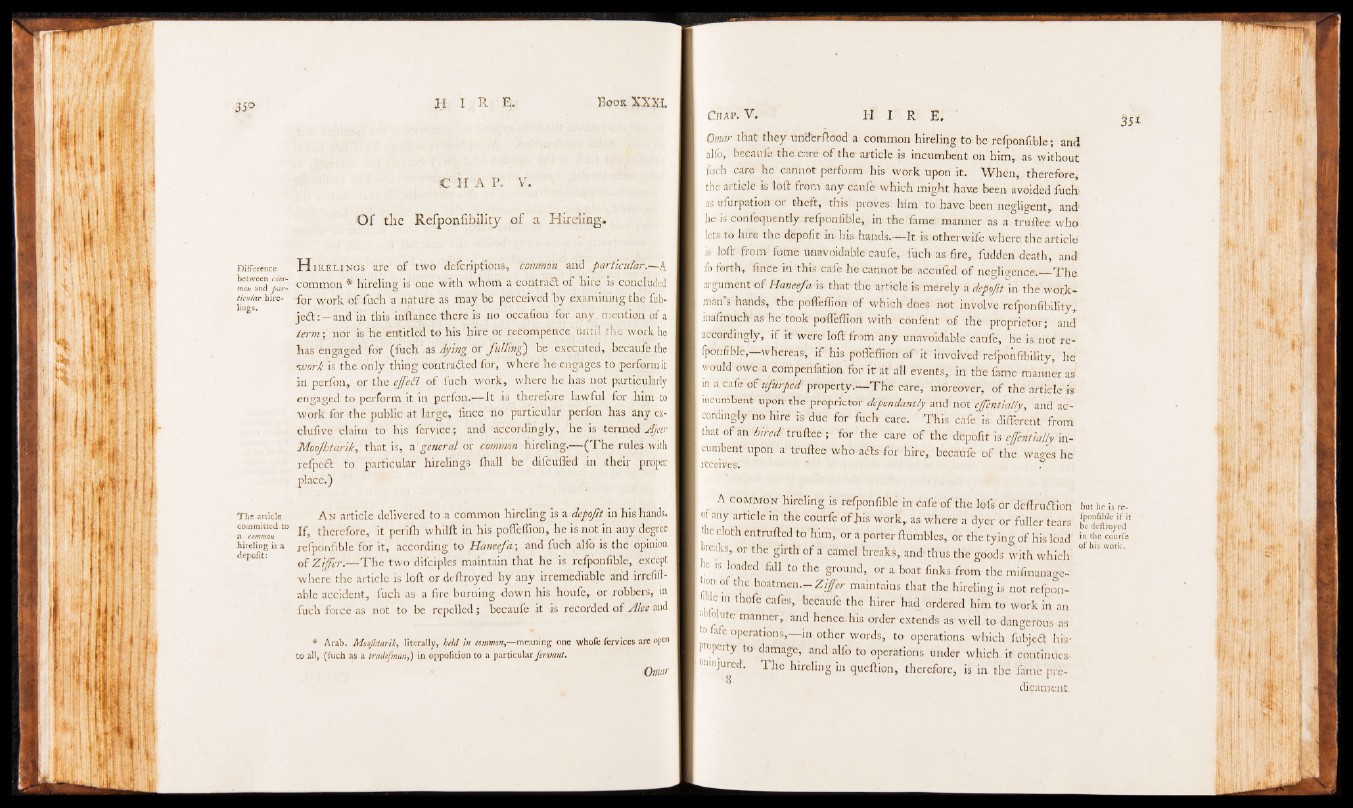
C i l A P. V .
Of the Refponfibility of a Hireling.
H i r e l i n g s are of two defcriptions, common and particular.—A
common * hireling is one with whom a contradt of hire is concluded
for work of fuch a.nature as may be perceived by examining the fub-
je£t:—and in this inftance there is no occafion for any mention of a
term-, nor is he entitled to his hire or retompence until the work he
has engaged for (fuch .as dying or fulling^ be executed, becaufe the
work is the only thing contracted for, where he engages to perform it
in perfon, or the effect of fuch work, where he has not particularly
engaged to perform it in perfon..— It is therefore lawful for him to
work for the public at large, fince no particular perfon has any ex-
clufive claim to his fervice; and accordingly, he is termed Jjeer
Moojhtarik, that is, a general or common hireling.— (T h e rules with
refpedt to particular hirelings fhall be difcuffed in their proper
place.)
The article A n article delivered to a common hireling is a depoft in his hands,
committed to therefore, it periih whilft in his poffeffion, he is not in any degree
hireling is a refponfible for it, according to Haneefa-, and fuch alfo is the opinion
of Ziffcr.— T h e two difciples maintain that he is refponfible, except
where the article is loft or deftroyed by any irremediable and irrefift-
able accident, fuch as a fire burning down his houfe, or robbers, in
fuch force as not to be repelled.; becaufe it is recorded of Alee and
* Arab. Moojhtarik, literally, h id in common,— meaning one whofe ferviccs are open
to all, (fuch as a tradefman,) in opposition to a particular firmmt.
Difference
between common
and particular
hire-
lings.
Omar
h i r e . 35* C h a p . V .
Omar that they un'dferftood a common hireling to be refponfible; and
alfo, becaufe the cai e-of the article 19 incumbent on him,, as without
fuch care he cannot perform his work upon it. When, therefore,
the article is loft from any caufe which might hav.e been avoided fuch
as ufurpation 01 theft, this proves him to have-been negligent, and
he is confequently refponfible, in the fame manner as a truftee who
lets to hire the dépolit in his hands.— It is otherwife where the article
is loft' from feme unavoidable caufe, fuch as fire, fudden death, and
fo forth, fince in this cafe he cannot be accufed of ne<diu-ence._T h e
argument of Haneefa is that the article is merely a depoftt in the workman's
hands, the poffeffion of which doe9 not involve refponfibility,
inafmuch. as he took polïèffion with confient of the proprietor; and
accordingly, if it were loft from any unavoidable caufe, he is not refponfible,
whereas, if his poflèffion of it involved refponfibility, he
would owe a compenfation for i t at all events, in the fame manner as',
in a. cafe of ufurpeA property.— T h e care, moreover, of the article is
incumbent upon the proprietor dependanlly and not effcntially, and accordingly
no hire is due for fuch- care. This cafe is different from
that of an hired truftee;- for the care o f the dfepofit is ejfentially incumbent
upon a truftee: who a£ts for hire, becaufe of the wages he
receives, " . ,
A c o m m o n hireling is refponfible in cafe o f the. lofs or deftruftion
of any article in the courfe of jiis work, as where a dyer or fuller tears
the cloth entrufted to him, or a porter ftumbles, or the tying o f his load
breaks, or the girth of a camel breaks, and-, thus the goods with which
be is loaded fall to the ground, or a. boat finks from the mifmanage-
tionof the boatmen.— Ziffcr maintains that the hireling is not refpon-
bble m thofe cafes, becaufe the hirer had ordered him to work in an
aifolute manner, and hence.his order extends as well to dangerous as
to afe operations,— in other words, to operations which fubjeft his-
Poperty to damage, and alfo to operations under which it continues-
uninjured. T h e hireling in queftion, therefore, is in the fame predicament.
but he is refponfible
i f it
be deftroyed
in the courfe
o f his work.